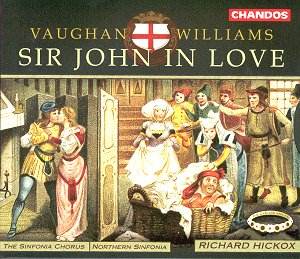I consider Riders to the Sea to be RVW's stage masterpiece but I have always had a sincere and lasting affection for Sir John in Love. Falstaff is my favourite Shakespearean character. He embodies all the strengths and weaknesses of human nature: he is a cheater and a liar, either bombastic or touchingly naive though he never forgets that he is a nobleman; and when trapped by his boundless imagination, he always manages a sometimes risky pirouette turning his folly into wisdom for - after all - "the world is but a play". Vaughan Williams' setting is simply magical. He found music either sweet or ironical and rumbustious that perfectly matches the many varied avatars occurring in Shakespeare's play. The libretto cleverly prunes Shakespeare's words and is interspersed with a number of Elizabethan lyrics, either by Shakespeare or by others. These provide adequate material for arias and ensembles lacking in Shakespeare's comedy. By so doing there is also the opportunity to weave some traditional tunes into his own. The result of all this is a joyous, exhilarating comic opera that cannot fail to move and amuse.
Musical delights of all sorts abound in Sir John in Love and it would be idle and totally pointless to list them all. Just think of the opening ensemble scene in which Slender, seemingly unaware of the bustle about him, vainly tries to devise a wooing song for Anne but never gets any further than "O sweet Anne Page". Other superb moments include the rollicking Drinking Song in the inn, the women's delightfully dancing Trio ("Sigh no more ladies"), Anne's beautiful aria ("This is my father's choice"), the love duet when Fenton's song ("Do but look on her eyes") is answered by Anne's "Come, o Come my Life's Delight", the enamoured Dr Caius's rapturous singing of an old French love song, Ford's rage when told about Falstaff's appointment with his wife (his raging "Cuckold" being echoed by the women's "the cuckoo then") and the joyous final ensemble.
As already mentioned, the opera is not without its tender moments such as the short scene in which Ford begs his wife's pardon or the unmasking scene in Windsor Forest, slightly redolent of another similar passage in Nielsen's Maskarade. One could go on like this at length; Sir John in Love brims with invention, be it in tender moments or in jollier ones. Vaughan Williams' imagination really catches fire here and in this opera the composer is at his most inspired, subtle, tuneful and colourful.
The present performance closely adheres to that recorded years ago by Meredith Davies for EMI (still available on EMI CMS5 66123-2), the only difference being Hickox's inclusion of the short episode in Act I (track 6) which is absent from Davies' reading. The performers in this newcomer are all excellent, if at times marginally lacking in characterization, though never seriously so. The female singers are generally outstanding (as in the aforementioned Trio). Donald Mitchell portrays a colourful Falstaff and his voice has some extra "fatness" which EMI's Raimund Herincx lacked at times. Matthew Best may slightly lack Robert Lloyd's vocal presence as Ford though his is again a very fine performance. Stephen Loges' Host of the Garter is dignified enough to match his conciliatory part and is superb in his aria in Act III Scene 1. Not mentioning them all is not intended as a disservice to the other singers. Quite the contrary, for everyone sings with obvious and therefore communicative enjoyment. Richard Hickox conducts RVW's wonderful score with his customary commitment, flair and sympathy and the Northern Sinfonia responds with enthusiasm.
In short, if you are happy with Meredith Davies' very fine, somewhat older performance but with a very distinguished cast, you may rest content with it. If you do not know this delightful opera, you must rush to get Hickox's reading which has the benefit of a richer, warmer sound and you will be in for a glorious musical experience.
Hubert Culot

